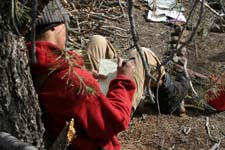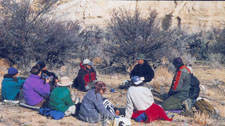 Wilderness programs are therapeutic adventure programs with a focus on clinical intervention and assessment. They use the outdoors as a platform to explore painful, personal issues in a nature based environment. Trained therapists and a peer group culture are used to initiate a cycle of change.
Wilderness programs are therapeutic adventure programs with a focus on clinical intervention and assessment. They use the outdoors as a platform to explore painful, personal issues in a nature based environment. Trained therapists and a peer group culture are used to initiate a cycle of change.
These programs are highly effective for teens that are defiant, show a sense of entitlement, lack self-esteem/confidence, are experiencing family conflict, have poor impulse control, may be chemically dependent, underachieving or angry. The wilderness setting removes modern distractions, simplifies choices and teaches valuable lessons. As a result, students begin to accept responsibility for personal decisions, address individual and family issues, and become invested in their character development.
 In a small group of 8 to 10 students, students gain insight into their behavior, develop short and long-range plans, construct shelters, prepare meals and plan activities. No behavior goes unnoticed or unaddressed. As the student begins to build relationships with both peers and counselors and becomes part of the group, he begins to achieve a feeling of self-respect and understanding of others, as well as pride.
In a small group of 8 to 10 students, students gain insight into their behavior, develop short and long-range plans, construct shelters, prepare meals and plan activities. No behavior goes unnoticed or unaddressed. As the student begins to build relationships with both peers and counselors and becomes part of the group, he begins to achieve a feeling of self-respect and understanding of others, as well as pride.
- These programs are often used for as an initial intervention in a plan to assist a family with a long range placement.
- A “trek” type model is used, where small groups of teens, along with several staff (clinical supervisor, wilderness guide, counselors and EMT) leave a base camp and hike or trek in wilderness areas, carrying all their needs in backpacks.
- Little or no academics are provided.
- Weekly phone calls to the family take place with the primary therapist. Letter writing, progress reports, training sessions and family weekend are often included.
- Teens are often resistant to placement and must be professionally escorted to the program.
The typical stay is 30-60 days.
Costs from $475- $550 per day, or $20,000 to $25,000 for a 42 day length stay. Students may stay up to 10-12 weeks.





